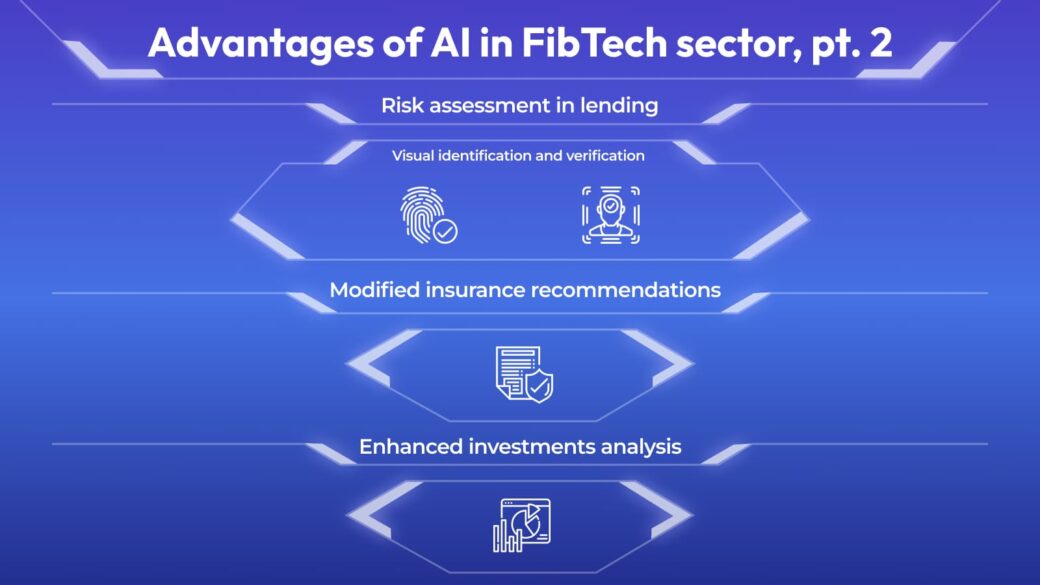Artificial Intelligence (AI) has grown in significance within the FinTech industry. Artificial Intelligence is utilized in various ways, such as enhancing customer engagement, offering tailored services, and improving productivity.
Solutions AI Brings to FinTech
Let’s explore how this revolutionary technology can tackle financial challenges and make our lives easier.
1. Enhanced customer service
The banking industry has undergone significant transformations in recent years, primarily due to advancements in FinTech and AI. Banks in the past experienced less efficient services due to limited technology, resulting in delayed responses to customer queries. AI has facilitated the provision of solutions by FinTech firms that cater to user requirements significantly faster. Chatbots have been recognized as a significant advancement in the field of AI.
Chatbots utilizing artificial intelligence have proven to be highly effective in enhancing customer satisfaction within the FinTech sector. Bots handle tasks like loan approvals and money transfers without needing humans. Customers can now quickly get fast responses to their queries with this automated system, which was only possible after manual processes. It boosts brand loyalty and attracts more customers through personalized experiences.
2. Fraud predictions
An AI-driven fraud detection system has the capability to store a multitude of fraud scenarios and unveil concealed fraudulent techniques. It runs seamlessly and autonomously detects fraudulent activities. By studying customer behavior and recognizing deviations from normal patterns, this system can even predict potential fraud. Hence, it is highly recommended to incorporate AI into the development of FinTech applications to bolster customer security. Utilizing Artificial Intelligence for fraud detection is a prevalent practice, and building trust in your software can significantly contribute to the success of your company.

3. Better risk assessment
Using AI for data automation and credit risk assessment facilitates greater access to financial services. Artificial intelligence generates credit scores that measure a client’s capacity and inclination to pay off debts, delivering a detailed review through a singular numerical figure. When calculating this score, various factors, such as income, credit history, transaction analysis, and work experience, create a detailed understanding of the customer’s financial situation.
AI algorithms analyze real-time data from each customer in vast quantities to generate these evaluations. The data is analyzed using statistical models and parameters to determine the appropriate credit score for the individual’s current circumstances. Implementing data automation and machine learning via AI has enabled businesses, including banks and creditor services, to provide accurate assessments quickly. This has opened up opportunities for individuals who may not have qualified for traditional financing to access better rates.
4. Better insurance recommendations
The insurance sector traditionally relies on traditional financial tools for risk assessment and evaluation. However, recent advancements in FinTech applications and the Internet of Things (IoT) have brought about substantial changes in how companies gauge risk. For instance, the automotive industry has introduced a system where a mobile app assesses driving behavior to determine personalized premium discounts for clients. Furthermore, the insurance industry is increasingly embracing smart contracts as a favored solution. This technology leverages blockchain and AI to expedite the digital signing of contracts between insurers and their clients.
The AI integration in this industry offers the prospect for predictive analytics that enhance comprehension of client requirements and inclinations. Utilizing this data improves pricing accuracy and enables insurers to develop customized policies that efficiently meet customer needs. AI-driven solutions can provide more personalized services, creating new opportunities for value creation for customers and organizations in this sector.
5. Improved investment analysis
Hedge funds are considering implementing AI systems to enhance investment analysis by processing important data. Several hedge funds have implemented automated investment methods utilizing computer models, but their outcomes were subpar. AI in FinTech is a great way to improve automation.
Imagine a hedge fund that runs itself, with AI pulling the strings and executing all stock exchange operations seamlessly! AI analyzes market data to make predictions every day. An AI system can make optimal decisions based on all available options for the present day. Investors have the opportunity to become our customers and enhance their investment process, leading to increased profits.
FinTech and AI: Potential for Your Financial Software
We have information on how artificial intelligence can take your FinTech software to the next level. Let’s find out how new data processing technologies in the marketplace drive AI in the FinTech industry.
The combination of factors such as the advancement of data processing, modifications in machine learning algorithms, decreased service costs, and increased customer demands have led to the integration of AI in the FinTech industry. Artificial intelligence in finance and economics is a valuable tool for staying competitive. The applications of AI-based technologies are extensive and worth considering. Artificial intelligence can quickly process information, acquire new skills, and engage in self-learning at an unprecedented pace. Improving human-computer interaction is made possible by computer algorithms capable of self-improvement.
Conclusion
While AI has advantages, it is essential to consider that interactions between humans can often be more effective due to the inclusion of moral considerations. Overall, AI presents more advantages than disadvantages.



